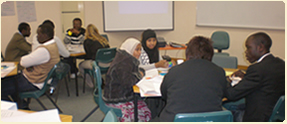support



top ten tips for supporting refugee students
SUPPORT TIPS
1. It is important that academics appreciate the difficulties refugee students have with grasping academic English and support their development with constructive criticism and praise when displaying improvement.
2. Avoid the use of abbreviations and acronyms in lectures and handouts, as many non-Australian born students will be unfamiliar with these terms. When and if used, then ensure they’re explained properly at the beginning of the lesson.
3. Refugee students have less experience using computers and will need support, patience and encouragement with online researching, use of the library catalogue and assignment development and writing.
4. Students from different backgrounds conceptualise time management differently. Make yourself approachable to discuss the importance and management of deadlines.
5. Students are often working and speaking in more than one language, often with English not as their first language. Allow time for students process and translate discussions and be patient when receiving their contributions
6. Appreciate that students from refugee backgrounds may not participate in class discussions due to cultural issues. Consider asking these student for their input if they’re having trouble participating. Ask them if there is any way you could support them during discussions.
7. Additionally, the expectations and the way tutorials are run can be explained at the beginning the semester so all students have a better understanding of them.
8. If the topic is Australian focused, ask students if they can make any comparative contributions to the issues from their experiences in other countries, and provide backgrounds to the topic as they will be unfamiliar with Australian history.
9. It is important for academics to realise that their past educational experiences did not allow them to make judgements or give opinions. Foster their critical thinking and asking of questions by reassuring students that critical debate is welcomed and is not disrespectful.
10. Understand that past traumatic experiences will make them unwilling to reveal information about themselves, and their families
11. Frequently reassure students of their efforts and progress. Refer them to the learning centre or other services on campus they may benefit from and may be unaware of to further support and enhance their learning.
12. Provide students with opportunities to allow them to be successful, and that encourage them to express their international experience, and perspectives as a way to increase participation. Recognise the value of their knowledge and past experiences as valuable to the current learning environment.



